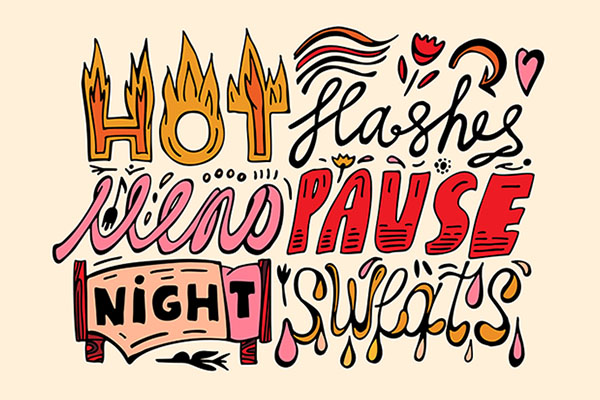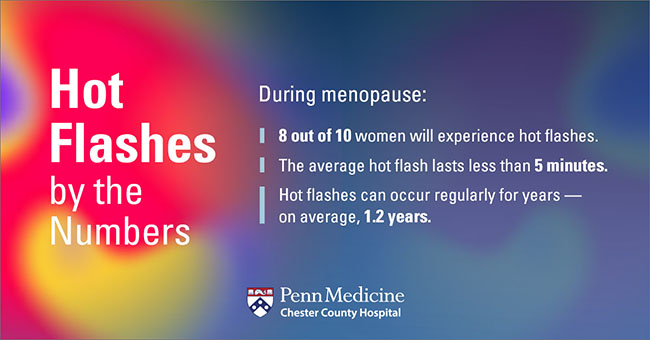
Uh oh. All of a sudden an intense feeling of warmth is spreading through your body. Your heart is beating faster than normal. Your face, chest, and neck feel like they're on fire, and a bead of sweat is trickling into your eyes. And down your neck. And down your back.
You look in the mirror and your face is red and flushed. You feel like you're dying — what is going on?

If you are a woman between 45 and 55 and this sounds like something you've experienced, you may have had a hot flash — or if this feeling woke you up from a good night's sleep, the night sweats.
Your first hot flash, also jokingly known as a "personal summer", can make you worry that it's a side effect of something serious. You may have questions about what in the world is going on in your body.
Here are answers to some of the pressing questions you may have about hot flashes.
What Is a Hot Flash?
A hot flash is a feeling of intense heat, typically in the upper body — which may be followed by a feeling of chills when the hot flash is over.
Common symptoms of a hot flash include:
- Warm or hot feeling in your upper body
- Flushed feeling in your face or neck
- Blotchy or red skin, like on your arms, chest or back
- Sweating
- Dizziness or nausea
- A feeling of uneasiness or anxiety right before the hot flash
- A pounding heartbeat
What Is Causing My Hot Flashes?
The most common cause of a hot flash is menopause. During menopause and the period leading up to menopause (called perimenopause), your body's hormone levels are changing, particularly with a drop in your estrogen and progesterone levels.
A hot flash generally is over in a few minutes, but it can feel like a very long few minutes.
Can My Hot Flash Be a Sign of Something More Serious — Like Cancer?
Most of the time, hot flashes are a sign of hormonal changes in your body related to the menopausal transition. If you are a woman around the age of 45 to 55 (or a little younger or older), it's likely that hot flashes are just a normal part of aging, annoying as they may be.
But there are a few cases where hot flashes can have another cause:
- Thyroid Condition: Sometimes, common symptoms of menopause, like heat intolerance and a fast heartbeat, aren’t signs of menopause at all, and may be connected to an issue with your thyroid. Talk to your provider if these symptoms just seem to suddenly show up, and they can do a simple blood test to rule out or confirm potential thyroid conditions as a cause.
- Cancer Treatments or Other Medications: If you are undergoing cancer treatment, you may experience hot flashes as a result of the treatment — but not as a result of the cancer itself. When undergoing radiation, chemotherapy, or other hormone and drug therapies, hot flashes can be a frustrating side effect. It’s also common for cancer survivors to continue experiencing hot flashes even when not receiving treatment, so don’t panic.
While people often think of hot flashes as something that women experience, they can also affect men, especially as it relates to some forms of radiation therapy, like androgen deprivation therapy (ADT) for men with prostate cancer. Because of the stigma around different kinds of cancer and cancer treatment, some men may be hesitant to talk about their symptoms. Yet in the case of ADT, more than 90% report experiencing hot flashes.
Is There Anything I Can Do About Hot Flashes?
Hot flashes are a regular part of aging for the majority of women, but they can also be a disruptive part of aging. You may be worried about a hot flash showing up at the wrong time — like during a presentation at work. Or night sweats might be keeping you from getting a good night of sleep. You don't have to let hot flashes stop you from living. Here’s how you can address these symptoms at home or with the help of your provider.
At-Home Solutions:
While there are medications that can address hot flashes, there are many steps you can take first to help manage your hot flash symptoms or reduce their frequency. You can:
- Wear more than one layer of clothing that can be easily removed when a hot flash begins, like a cardigan and a blouse instead of just one heavier piece of clothing.
- Avoid smoking, drinking alcohol and eating spicy food.
- Put a small portable fan in your purse to help cool you down during a hot flash.
- Make your sleep environment night sweats-friendly with a cooler temperature and multiple blankets (so you can shed them if you’re too warm).
Medical Solutions:
There are also hormonal and non-hormonal medications that may be able to help you manage your hot flashes. Beware that many "magical" solutions for hot flashes are not FDA-approved and have not been proven to be effective — and can even be dangerous. Talk to your primary care provider or gynecologist about options that can help you safely manage your hot flashes.
What If I Have Other Questions About My Hot Flashes?
Hot flashes can make you feel like your body is out of control, and when you're not sure what's causing a hot flash, you may assume the worst. If you have other questions about your hot flashes or night sweats, you're not alone.
Talk to your Ob/Gyn or your primary care provider about your symptoms or patterns you notice in your hot flashes. You don't have to suffer alone, and you may be surprised by how much there really is to know about your body's mini-sauna moments.
No question is too small. Just because many people have hot flashes, doesn't mean you have to settle for the discomfort. Together with your Chester County Hospital provider, you can get the answers — and maybe the relief — you're looking for.
Your Chester County Hospital provider can answer your questions and help you live more comfortably with hot flashes. Talk to your doctor today about managing hot flash symptoms.